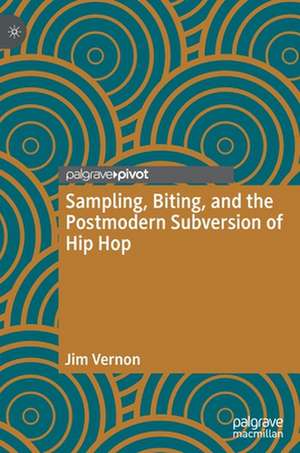Sampling, Biting, and the Postmodern Subversion of Hip Hop
Autor Jim Vernonen Limba Engleză Hardback – 22 iun 2021
Preț: 483.92 lei
Nou
Puncte Express: 726
Preț estimativ în valută:
92.60€ • 96.68$ • 76.64£
92.60€ • 96.68$ • 76.64£
Carte tipărită la comandă
Livrare economică 04-18 aprilie
Preluare comenzi: 021 569.72.76
Specificații
ISBN-13: 9783030749026
ISBN-10: 3030749029
Pagini: 133
Ilustrații: VII, 133 p.
Dimensiuni: 148 x 210 mm
Greutate: 0.33 kg
Ediția:1st ed. 2021
Editura: Springer International Publishing
Colecția Palgrave Macmillan
Locul publicării:Cham, Switzerland
ISBN-10: 3030749029
Pagini: 133
Ilustrații: VII, 133 p.
Dimensiuni: 148 x 210 mm
Greutate: 0.33 kg
Ediția:1st ed. 2021
Editura: Springer International Publishing
Colecția Palgrave Macmillan
Locul publicării:Cham, Switzerland
Cuprins
Chapter 1: Introduction.- Chapter 2: 'Never Let An MC Steal Your Rhyme’: The Aesthetics and Values of Hip Hop Culture.- Chapter 3: ‘Pure Treason, I’ll Tell You Why’: The Erasure of Hip Hop Culture by Rap Music and Postmodern Hip Hop Studies.- Chapter 4: ‘Sounding Black’: Theorizing Blackness in Justin Adams Burton’s Posthuman Rap.- Chapter 5: ‘The Fifth Element’: Knowledge, or Hip Hop’s Struggle Against Post-Rap Subversion.- Chapter 6: ‘Make Something Original’: Hip Hop Sampling from the ‘Golden Era’ to The Wu-Tang Clan.- Chapter 7: Conclusion: Hip Hop Studies After Reactionary Postmodernism.
Notă biografică
Jim Vernon is Associate Professor of Philosophy at York University in Toronto, Canada. He is the author of Hegel’s Philosophy of Language (2007), Hip Hop, Hegel, and the Art of Emancipation: Let’s Get Free (2018), and numerous articles on Continental philosophy and emancipatory political theory.
Textul de pe ultima copertă
Drawing on the culture’s history before and after the birth of rap music, this book argues that the values attributed to Hip Hop by ‘postmodern’ scholars stand in stark contrast with those that not only implicitly guided its aesthetic elements, but are explicitly voiced by Hip Hop’s pioneers and rap music’s most consequential artists. It argues that the structural evacuation of the voices of its founders and organic intellectuals in the postmodern theorization of Hip Hop has foreclosed the culture’s ethical values and political goals from scholarly view, undermining its unity and progress. Through a historically informed critique of the hegemonic theoretical framework in Hip Hop Studies, and a re-centering of the culture’s fundamental proscription against ‘biting,' this book articulates and defends the aesthetic and ethical values of Hip Hop against their concealment and subversion by an academic discourse that merely ‘samples’ the culture for its own reactionary ends.
Jim Vernon is Professor of Philosophy at York University in Toronto, Canada. He is the author of Hegel’s Philosophy of Language (2007), Hip Hop, Hegel, and the Art of Emancipation: Let’s Get Free (2018), and numerous articles on Continental philosophy and emancipatory political theory.
Caracteristici
Re-evaluates and challenges the presumptive claims in Hip Hop Studies Discusses the distinction between the philosophical/theoretical framework brought to bear on Hip Hop and the one which emerged from the culture itself Focuses on the tensions between the empirical history of Hip Hop's ongoing development, and the postmodern strain of Hip Hop studies
